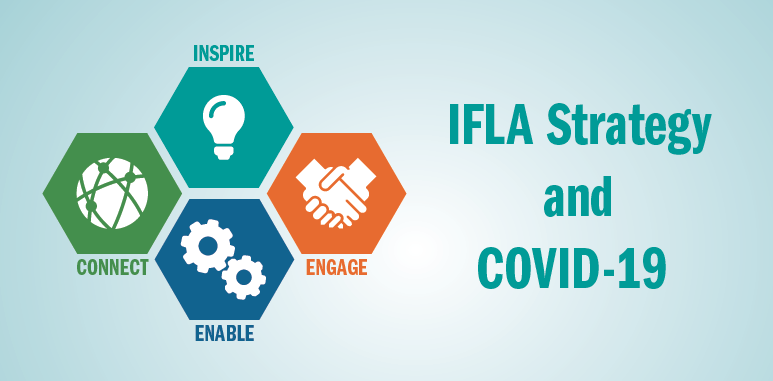In Uncertain Times, We Need Each Other More than Ever: The IFLA Strategy and COVID-19
02 July 2020

At the moment that the IFLA Strategy was launched at the World Library and Information Congress in Athens, Greece almost no-one could have imagined the world we live in today.
The COVID-19 Pandemic has forced libraries to close their doors, for the good of their users, their staff and their communities. There have been radical changes in the way that services are offered, and in how libraries stay in touch with and support those who depend on them for access to information and culture. There is a lot of talk about a “new-normal” in the world of libraries.
Many of these changes have been difficult. Where it has been impossible to offer computer access, people have needed to camp outside in order to use the WiFi, or simply give up.
Where the space that libraries provide for learning has become inaccessible, students have fallen behind. Where users do not have access to technology, they have risked isolation.
For many, both in our field and beyond, the social cost of library closures has served to make clear how important our institutions are to the people they serve.
Yet while the prospect of re-opening doors and restarting services is welcome, it is clear that any ‘return to normal’ will be slow, incremental, and may indeed never happen. We will need to reimagine libraries and build a ‘new-normality’.
We therefore face a time of uncertainty, but also opportunity. The Pandemic has led to a huge learning curve in many areas and many organisations, notably around the use of digital technologies by librarians and users alike, as well as a new clarity concerning the challenges created by outdated laws and practices.
Those processes change the ‘settings’ of our field accelerate the rhythm of development and allow us to do things that previously looked impossible, or could be achieved only in several years’ time.
The best way to understand and cope with the new situation, to develop this ‘new-normality’, is by sharing our experiences and perspectives, and continuing to pursue our values and missions. This will allow us to work better, individually and collectively, to achieve our goals.
The IFLA Strategy provides a great framework for doing this.
First of all, the Vision it sets out is as relevant as ever. Literate, informed and participatory societies are essential for stronger, fairer, more sustainable societies and economies in the long-run – as underlined when the Strategy was launched. Similarly, they will also be crucial if the recovery from COVID-19 is to be a reality for all.
It has also become clear that people who have lower skills, or are otherwise excluded, are being hit hardest by the Pandemic and its consequences. Faced with this, now is the time to build consensus on a point we have underlined for so many years: libraries are institutions that tackle these inequalities and therefore play a key role in societal transformation.
Secondly, the IFLA Strategy is born out of a perception across the global library field that we needed a document that would help us respond to change. It is not a strategy that is based on a static vision of the world, but rather one that is evolving, and that requires us to evolve with it, and ideally stay ahead of the curve in order to continue to provide vital services to our communities.
Rather than focus on specific outputs, it aims to increase our capacity, as a field, to respond, react and innovate. All the four pillars of the Strategy’s mission – to inspire, engage, enable and connect – are about building a stronger and more united global library field, better able to achieve the Vision, and more resilient in the face of shocks. It is a Strategy for uncertain times, such as those we are facing now.
Finally, it offers the flexibility necessary to ensure that we can adapt and develop initiatives – across borders and library types – that respond to needs. It is more than just a document – it is a starting point for action!
IFLA’s Professional Units have already rolled up their sleeves and demonstrated this potential, gathering inspiring examples, preparing webinars and developing training and other practical materials in different languages.
The Strategy also provides a framework for identifying where initiatives at the national or local level would provide opportunities for collaboration. We have seen, for example, that the situation facing libraries in areas with high levels of connectivity has been very different from those which cannot count on reliable and widespread internet access.
Using the Strategy as a guide, we will be developing action plans tailored to the needs of major world regions, as well as developing strong national library fields, better able to assess and respond to priorities on the ground.
Over half a year into the COVID-19 Pandemic, it is evident that it is likely to be with us for some time to come. The uncertainty it has brought should not, however, be a reason to delay or postpone innovation or thinking about the future.
On the contrary: it is a powerful argument for building our own capacity and resilience to respond, as well as to drive positive changes – something that we can best do together and with a compass so that no one gets lost on the way. The existence of one global strategy and many regional, national and local ones aligned to this wider vision and mission could not be more timely than now.
Gerald Leitner
IFLA Secretary General
Read more about the IFLA Strategy.